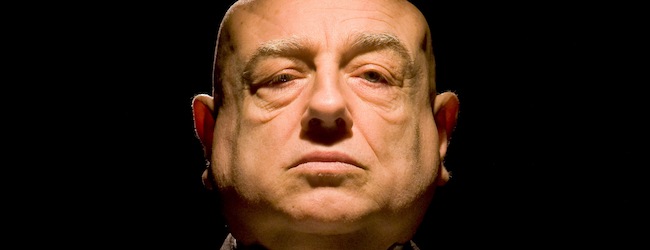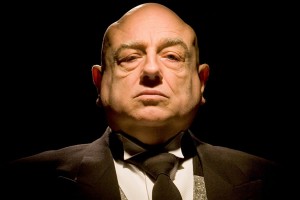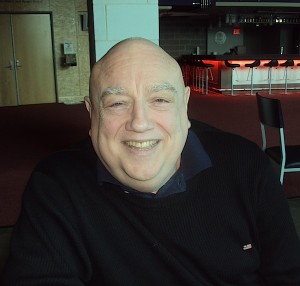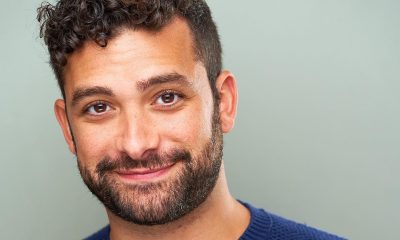Theater
Reprising Max
Gay actor Ed Dixon draws raves for ‘Sunset’ performance


Actor Ed Dixon as Max in Signature Theatre’s current production ‘Sunset Boulevard.’ (Production photo by Chris Mueller, courtesy of Signature)
Ed Dixon’s emotional pendulum — as one might expect from an actor — swings wide.
During an hour-long interview in the lobby of Signature Theatre where he’s on the boards each night as Max in “Sunset Boulevard,” Dixon laughs uproariously and heartily several times recanting tales and dropping names from his four-decade career. And though no tears appear, two of the stories he tells involve copious sheddings thereof.
One even came during “Sunset,” though it was during his initial encounter with the musical 14 years ago when he toured with it for a year with Linda Balgord as Norma.
“In the movie it cuts away from (Max) all the time, but on the stage he’s up there a lot of time in the background just suffering,” Dixon says. “At the end of act one there was a part where I stand behind a fringe curtain at the part where Norma pulls Joe down on top of her and I would just release the curtain down on my face. Well after standing there for six months or whatever it was in that condition, feeling this wretched, painful condition, it’s like your body doesn’t know you’re only kidding. It’s like you’re really experiencing that. This one night I just started crying and cried all during intermission. People were going, ‘Are you OK? I was like, ‘Uhh, not really.’ It had really built up over the run. So how do you deal with that every day for a year? It makes you kind of crazy.”
This production, which runs through Feb. 13 and has been the second-biggest hit in Signature’s 21-year history (after “Les Miserables”), hasn’t been as emotionally draining, Dixon says. But it has been taxing. Returning to the role has been rewarding and challenging, he says.
The lessons Dixon, 62, uses to coach actors and singers for auditions in New York, where he lives on the Upper West Side, have come in handy.
“It feels different doing eight shows a week than it did 14 years ago. I was really vocally stronger 14 years ago but I’ve also been very pleased to see how much agility I still have. … I went into daily training months ago.”
It’s the most vocally challenging part Dixon — who has extensive opera and musical theater credits — has done in years.
The Anadarko, Okla., native and son of a Church of Christ revival minister, knew early on he liked boys, even before he had the language to articulate it. Asked at church as a pre-schooler whom he would someday marry, he matter-of-factly answered Jimmy DeLong, a boy from his neighborhood.
“They said, ‘You can’t marry a boy.’ I said, ‘Why not?’ I remember that, but I didn’t know that I was gay. I just knew I liked Jimmy DeLong.”
Later, he had no idea what taunts (“Hey, queer ass!”) in middle school meant.
He arrived in New York (“Oklahoma is a wretched place,” he says) in the late ’60s and never looked back. Never even to visit his parents, from whom he was estranged and only saw twice in adulthood.
His big break came in the chorus of “No No Nannette,” a popular musical revival in 1970. Even though New York, and especially the theater world, was filled with gays at the time, it wasn’t an especially gay-friendly environment.
“Things were so different then you can’t even imagine it,” he says. “Even in the theater, you didn’t really talk overtly about it. And I was even more behind the times because I was coming from the Dark Ages. I remember in the dressing room of ‘No, No Nannette,’ there was an old queen who only spoke to us in the voice of Bette Davis and used to scare the fuck out of me. I was just like, ‘Oh god, please don’t let me end up like that, you know?’”
Even as recent as his first run with the touring version of “Sunset,” a role he’d eyed since it debuted in London in 1993, there were hints of homophobia in the casting process for the straight part. He knew everyone in the room and was chatting them up between readings. Before the callback, he was tipped off to tone it down.
“I’d had a big career by then,” he says. “One night at a party one of them pulled me aside and said, ‘They really want to know that you were married to her.’ I thought, ‘Are you kidding?’ I’d just been laughing and joking and being myself, you know, before and after I read. So I stayed Max through the whole callback and got it.”
This run, Dixon says, has been draining but creatively satisfying. He and co-star Florence Lacey have worked together several times before and enjoy a special camaraderie.
“We’re like an old married couple,” he says. “You know, I always go spend time with her in her dressing room before the show. She always tells me she loves me. She calls me Daddy and I call her Baby. It’s really sweet. She’s just one of those people who’s so sweet you think, ‘Is that real?” And with her it’s totally real.”
The feelings are mutual.
“Speaking about Ed Dixon, I’m always a gushing mess,” Lacey says. “Ed is a man of extraordinary talent with a big voice and a heart to match. He has a laugh that makes the whole world join in and he can break your heart with a look. He’s tough and sensitive both as an artist and in his friendships. I feel proud to call him my dear, dear friend.”
He’s worked non-stop since he came to New York except for a stint in rehab in the ’80s when he beat a cocaine addiction. Dixon just celebrated 20 years of sobriety.
After “Sunset” ends its run, Dixon will tour with the musical “Curtains.” And a comedy he wrote called “Scenery,” which explores the inside tract of a showbiz Lunt/Fontanne-esque couple in which the husband is gay, is getting rave reviews in Cleveland where it just opened.
Dixon says a life-defining moment came watching his mentor, the character actor George Rose, from whom he learned much about acting and life.
“He was middle aged, this gay, effete, Englishman, and he came into the room and he was just the most powerful man I had ever been in the presence of. That was a big moment for me. Because of him I realized, ‘Oh, you can be gay and still powerful.’ I didn’t know that before.”
Theater
‘Bad Books’ a timely look at censorship in local library
Influencer vs. conservative parent in Round House production

‘Bad Books’
Through May 4
Round House Theatre
4545 East-West Highway
Bethesda, Md.
Tickets start at $43
Roundhousetheatre.org
While a library might seem an unlikely place for a heated contretemps, it’s exactly the spot where adults go when they’re itching to battle out what books minors might be allowed to read.
In Sharyn Rothstein’s “Bad Books,” two women, The Mother (out actor Holly Twyford) and The Librarian (Kate Eastwood Norris), swiftly become mired in a quarrel that comes with some weighty repercussions.
The Mother is a popular conservative influencer on a mission. She’s furious that the local library has overstepped its bounds and she blames The Librarian, a woman who adheres to the “it takes a village” method of child rearing and is dedicated to the young people who approach her reference desk.
There’s some background. It seems The Librarian who dresses young (tight jackets and Doc Martens) and curses a blue streak, forged a friendship with Jeremy, a teenage library regular.
While the details are a bit hazy, it seems the troubled Jeremy confided in The Librarian regarding some personal issues. In return, she suggested a helpful book – Boob Juice.
Unsurprisingly, based solely on its title, the book has thrown The Mother into a pique of outrage. After finding Boob Juice in her son’s bedroom, she made a beeline to the library; and not incidentally, The Mother hasn’t read the recommended work and has no plans to do so.
Set in a suburb with lax gun laws, the story explores facets of division and conciliation. The Mother insists she isn’t so much about banning books as she is keeping some books away from young people until they’ve obtained parental approval.
“Bad Books” is performed in the round. Built on a rotating stage, Meghan Raham’s set is simple, pleasingly serviceable, and easily transforms from the library into a small corporate office, and later the assembly room of a church. Overhead floats a circular glass shelf filled with a cache of banned books. Things like a rolling book cart and a goldfish bowl add some flavor to the different locations.
The Mother wasn’t always a popular conservative warrior with an enthusiastic horde of followers.
Her past includes penning a book that later filled her with guilt and regret. She refers to that early questionable literary accomplishment as her bad book. And while over the years, she has persevered to find and destroy each and every printed copy, she hasn’t entirely succeeded.
Norris plays three women who figure meaningfully into the arc of Twyford’s mother character. In addition to The Librarian, Norris is The Manager, a broadly played piece of comic relief, and The Editor, a warm woman who reveals things about Jeremy that his own mother never knew.
Smartly staged by Ryan Rilette, the production is part of a National New Play Network Rolling World Premiere. While Rothstein’s script offers two strong roles (skillfully performed by celebrated actors Twyford and Norris), its ending feels too neatly resolved.
In the past, Twyford and Norris have successfully joined forces for numerous DMV productions including Studio Theatre’s production of David Auburn’s two-hander “Summer, 1976,” the story of a longtime and unlikely friendship between two women who meet as young mothers during the Bicentennial summer.
Though different, both The Librarian and The Mother share a strong and ultimately hopeful relationship with words.
There’s a quote from E.B. White’s classic “Charlotte’s Web” that pops up a couple of times in the briskly paced 80-minute play. Charlotte, the wise spider, says, “with just the right words you can change the world.”

‘Uncle Vanya’
Through April 20
Shakespeare Theatre Company
Harman Hall
610 F St., N.W.
Shakespearetheatre.org
Shakespeare Theatre Company’s “Uncle Vanya” freshly rendered by director Simon Godwin and starring Hugh Bonneville in the title role, puts a pleasing twist on Chekhov’s tragicomic classic.
As disheveled, disheartened, and overworked Vanya, Bonneville is terrific. Though very different from the actor’s fame making role as Downton Abbey’s Lord Grantham, a proud, fastidiously turned-out aristocrat who presides over a manicured country estate peopled by a large staff, his Vanya is equally compelling
For “Uncle Vanya,” Chekhov imagines a house on a ragged estate in the Russian forest whose inhabitants display varying degrees of discontent brought on by the realization that they’re leading wasted lives. Middle-aged Vanya’s dissatisfaction and disappointment have been tempered by years of hard work. But all of that is about to be challenged.
With his plain and steadfast niece Sonya (Melanie Field), Vanya keeps the place going. And while barely putting aside a kopek for himself, he’s ensured that proceeds have gone to Sonya’s father Alexandre, a querulous academic (Tom Nelis), and his alluring, much younger second wife Yelena (Ito Aghayere) who live in the city.
When called to retire, the self-important professor and his wife economize by joining the family in the country. Overcome by the intense boredom brought on by provincial isolation, they’re not happy. Turns out, life in the sticks isn’t for them.
At the same time, the urban couple’s presence generates quite an effect on the rural household, changing the mood from one of regular work to idleness. What’s more, Vanya and family friend Mikhaíl Ástrov (John Benjamin Hickey), an unusually eco-aware, country doctor, are both bewitched by Yelena.
Meanwhile, young Sonya, who’s long carried an unrequited torch for Ástrov grows increasingly smitten. And while Yelena, who’s bored with her aging husband, expresses teasing tenderness with Vanya, she feels something more serious for Ástrov. It’s a whole lot for one house.
Superbly staged by Simon Godwin, STC’s artistic director, and performed by a topnotch cast, the very human production begins on an unfinished stage cluttered with costume racks and assorted props, all assembled by crew in black and actors in street clothes. We first see them arranging pillows and rugs for an outside scene. Throughout the play, the actors continue to assist with set changes accompanied by an underscore of melancholic cello strings.
With each subsequent scene, the work moves deeper into Chekhov’s late 19th century Russian world from the kitchen to the drawing room thanks in part to scenic designer Robert Brill’s subtle sets and Susan Hilferty and Heather C. Freedman’s period costumes as well as Jen Schriever’s emotive lighting design.
In moments of stillness, the set with its painterly muted tones and spare furnishings is a domestic interior from a moment in time. It’s really something.
Adapted by contemporary Irish playwright Conor McPherson, the work is infused with mordant wit, ribald comedy, and sadness. Like McPherson’s 2006 play “The Seafarer” in which the action unfolds among family, friends and others in a modest house filled with confrontation, laughter, resentment, and sadness. All on brand.
For much of “Uncle Vanya,” McPherson’s script leans into humor, funny slights, the professor’s pretentions, and Vanya’s delicious snarky asides; but after the interval, the play’s stakes become perilously heightened ready to explode with resentment and feelings of wasted potential, particularly frustrations expressed by Vanya and his intelligent but unfulfilled mother (Sharon Lockwood).
When it appears that mismatched couple Alexandre and Yelena are poised to depart, the house is struck with a sense of both relief and gloom.
Not everyone is disturbed. In fact, the family’s old nanny Nana (Nancy Robinette), and Waffles (Craig Wallace), a former landowner and now lodger on the estate, are elated. Both are eager to return to the pre-professor schedule of an early breakfast and midday lunch, and menus featuring simpler fare. They long for the return of the humble Russian noodle.
“Uncle Vanya”melds cynicism and hope. Like life, it’s a grasp at fulfillment.
Theater
Out actor Ángel Lozado on his new role in ‘In the Heights’
Lin-Manuel Miranda’s musical at Signature Theatre through May 4

‘In the Heights’
Through May 4
Signature Theatre
4200 Campbell Ave., Arlington, VA
Tickets start at $40
Sigtheatre.org
Before his smash hit “Hamilton” transformed Broadway, Lin-Manuel Miranda wrote “In the Heights,” a seminal musical set in an upper Manhattan barrio. Infused with hip-hop, rap, and pop ballads, the romance/dramedy unfolds over a lively few days in the well-known Latin neighborhood, Washington Heights.
Now playing at Signature Theatre in Arlington, “In the Heights” features handsome out actor Ángel Lozado as the show’s protagonist Usnavi de la Vega (named for a U.S. Navy vessel), a young Dominican American bodega owner who figures warmly in the center of the hood and the action.
A durable part that Lozado has wanted to play for some time, it’s proved the perfect vehicle to showcase his talents in a story that rings true to his heart.
WASHINGTON BLADE: Timing is very important to you.
ÁNGEL LOZADO: During rehearsal at Signature, our director James Vásquez said “In the Heights” finds you at a time when you need it. And that definitely resonates with me.
In the past I was up for Usnavi several times and then I was standby in the part for two weeks at the Muny in St. Louis but never called to go on.
And then, I lost my grandmother in January and was cast at Signature. In the show, the neighborhood loses their abuela [played by Rayanne Gonzales], I feel like I was meant to play the part at this moment. I’m a firm believer in the timing of it all.
BLADE: You’ve trained vocally at Florida State University, debuted on Broadway in “Bad Cinderella,” sang in “Jesus Christ Superstar Live (NBC),” and sung in many other musicals, but I’m guessing this is different?
LOZADO: Rapping is the most challenging part of the role. I’m trained in musical theater. I can sustain eight shows a week, but this is different. Rapping is more taxing. It’s challenging. With rap it’s clipped and the throat gets tighter.
BLADE: Like so much of Manhattan,Washington Heightshas changed a lot since 2008 when the show is set.
LOZADO: I currently live in Washington Heights and it’s very gentrified. Rents are high. I don’t think it was their intention to do a period piece but “In the Heights” is a period piece.
BLADE: And you grew up in Orlando, Fla., where before discovering theater, you were heavily into baseball.
LOZADO: I’m Puerto Rican, and baseball is a big part of our culture. My parents put me on a team at five, and I played first base through mid-high school. That was going to be a career. Went from one crazy career to another. When I got to high school, I was struggling with my queerness being in the sports world — struggled with my identity and the space I was in, I lost my love for baseball.
BLADE: How did you find your way to theater?
LOZADO: Through high school choir. It was a hard switch, but one that I couldn’t resist.
BLADE: You’ve been openly queer in the business. Has that ever been a problem?
LOZADO: I don’t know if it’s problematic or not. As actors, we don’t get behind the closed doors of casting. I do know that I’ve gotten to play lots of roles regionally that are straight men and that hasn’t been a problem.
Then again, I’ve cosplayed as a straight man most of my life. It makes me laugh when people see me offstage, they’re like, “Wow, you were really convincing as straight on stage.” I’ll take that compliment because that means I’m acting.
BLADE: Tell me about other roles you’ve played
LOZADO: Latin roles: Usnavi, Bernardo in “West Side Story,” Emilio Estefan in “On Your Feet!” and Che in “Evita.”And while I was thrilled to play those great parts, at the same time, I had friends getting auditions that weren’t specific to them being white, Black, or whatever. I worked with people who are more seasoned in the industry who had done 12 productions of “Evita.” I didn’t want to do that. I love representing my culture but I’d also like to do parts that have nothing to do with that. Dream roles include Sondheim’s “Sunday in the Park with George.”
BLADE: And how about a new work? Would you like creating a role on Broadway?
LOZADO: Oh yes, that’s the big dream.
BLADE: Do you think “In the Heights” might appeal to both Latin and queer audiences?
LOSADO: Yes.To see a people show themselves in a way that’s different from the stereotypes, telling our story in our own way, and not allowing the headlines define who we are, but to stand up in our joy.
“In the Heights” holds up the Latin community and, for me, that’s a parallel to the queer community, celebrating itself, especially in the upcoming time of WorldPride DC 2025 events (May 23-June 8).
-

 State Department4 days ago
State Department4 days agoHIV/AIDS activists protest at State Department, demand full PEPFAR funding restoration
-

 Brazil4 days ago
Brazil4 days agoUS lists transgender Brazilian congresswoman’s gender as ‘male’ on visa
-

 District of Columbia4 days ago
District of Columbia4 days agoCapital Pride wins $900,000 D.C. grant to support WorldPride
-

 Mexico3 days ago
Mexico3 days agoGay couple claims Puerto Vallarta wedding venue discriminated against them













